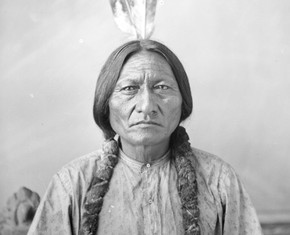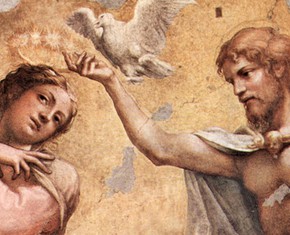The views expressed in our content reflect individual perspectives and do not represent the authoritative views of the Baha'i Faith.
So far in this series of essays we’ve discussed the history and the essential teachings of the Baha’i Faith—now let’s examine its relationship to the prophetic expectations of other religions.
For the sake of brevity we will limit our focus primarily to the New Testament and Christian prophecy. For more information on how the prophecies of other religions are fulfilled by Baha’u’llah, you may wish to consult Islam and the Baha’i Faith; Hinduism and the Baha’i Faith; and Buddhism and the Baha’i Faith, all by Moojan Momen; or Jamshed Fozdar’s book Buddha Maitrya-Amitabha Has Appeared.
Baha’u’llah wrote about his revelation: “This is the changeless Faith of God, eternal in the past, eternal in the future.” – Gleanings from the Writings of Baha’u’llah, p. 136.
With this statement Baha’u’llah affirmed the continuity of the Cause of God, revealed through a successive line of prophets stretching from the dawn of history to the present day. Although Baha’u’llah’s revelation represents the fulfillment of the prophetic statements of all previous messengers, it shares much in common with earlier revelations. God’s manner of interaction with humanity has not altered over time. The means whereby He sends His teachings to humanity, the essential spiritual truths that those teachings convey, and His expectations of us are the same now as they have always been.
To illustrate this process, we will turn to the example of Christ, but first it is important to reaffirm what the Baha’i writings have to say about him and about Christianity. Shoghi Effendi wrote:
As to the position of Christianity, let it be stated without any hesitation or equivocation that its divine origin is unconditionally acknowledged, that the Sonship and Divinity of Jesus Christ are fearlessly asserted, that the divine inspiration of the Gospel is fully recognized, that the reality of the mystery of the Immaculacy of the Virgin Mary is confessed, and the primacy of Peter, the Prince of the Apostles, is upheld and defended. The Founder of the Christian Faith is designated by Baha’u’llah as the “Spirit of God,” is proclaimed as the One Who “appeared out of the breath of the Holy Ghost,” and is even extolled as the “Essence of the Spirit.” His mother is described as “that veiled and immortal, that most beauteous, countenance,” and the station of her Son eulogized as a “station which hath been exalted above the imaginings of all that dwell on earth,” whilst Peter is recognized as one whom God has caused “the mysteries of wisdom and of utterance to flow out of his mouth.” – The Promised Day is Come, pp. 109-110.
Abundant references to Christ are found in the writings of Baha’u’llah. On the subject of Christ’s sacrifice, he said:
Know thou that when the Son of Man yielded up His breath to God, the whole creation wept with a great weeping. By sacrificing Himself, however, a fresh capacity was infused into all created things. Its evidences, as witnessed in all the peoples of the earth, are now manifest before thee. The deepest wisdom which the sages have uttered, the profoundest learning which any mind hath unfolded, the arts which the ablest hands have produced, the influence exerted by the most potent of rulers, are but manifestations of the quickening power released by His transcendent, His all-pervasive, and resplendent Spirit.
We testify that when He came into the world, He shed the splendor of His glory upon all created things. Through Him the leper recovered from the leprosy of perversity and ignorance. Through Him the unchaste and wayward were healed. Through His power, born of Almighty God, the eyes of the blind were opened, and the soul of the sinner sanctified.
. . . He it is Who purified the world. Blessed is the man who, with a face beaming with light, hath turned towards Him. – Gleanings from the Writings of Baha’u’llah, pp. 85-86.
Baha’u’llah frequently defended the Bible to Muslim audiences. Although Islam recognizes Jesus as a messenger of God, many Muslims believe that the Bible (both the Old and New Testaments) has been corrupted and cannot, therefore, be regarded as the authentic repository of the Word of God. Baha’u’llah challenged this belief on two grounds: First, he asserted that the followers of Islam who hold this view have misunderstood certain statements in the Koran that actually mean that the followers of the Bible have misinterpreted it, not that the Bible itself is corrupt; second, he said that God, in His justice, would never hold people accountable for obeying His Word if they did not actually possess it:
We have also heard a number of the foolish of the earth assert that the genuine text of the heavenly Gospel doth not exist among the Christians …. How grievously they have erred! How oblivious of the fact that such a statement imputeth the gravest injustice and tyranny to a gracious and loving Providence! – Baha’u’llah, The Book of Certitude, p. 89.
Abdu’l-Baha made this beautiful statement about the Bible: “This book is the Holy Book of God, of celestial Inspiration. It is the Bible of Salvation, the Noble Gospel.” – Abdu’l-Baha in London, p. 18.
From these statements it is clear that Baha’u’llah and his followers love and revere both Christ and the Bible.
















Comments
Sign in or create an account
Continue with Googleor